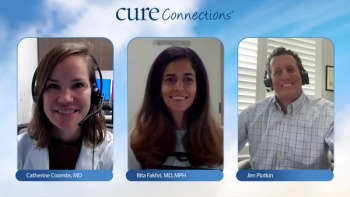
Rechallenging Therapy in NSCLC
Preferences for rechallenging patients with non-small cell lung cancer with immunotherapy based on previous experiences in terms of treatment-related side effects.
Episodes in this series

Charu Aggarwal, M.D., MPH: I find that, overall, the quality of life for the majority of our patients on immunotherapy is spectacular. The side effects that we’re talking about impact a minority of the patients. In fact, there are some really intriguing data that having an side effect with immunotherapy may lead to superior outcomes. What are your thoughts about that, Hoss?
Hossein Borghaei, DO, MS: That’s a fascinating developing story. We started seeing some case reports or single institution reports about toxicities being associated with better outcome. And now we have a pretty heavy data set suggesting that can be true. We’re going to see more of those kinds of data coming. You can come up with a number of different theories to explain why that might be; why someone who has a side effect with a checkpoint inhibitor might do better in terms of clinical outcome. But the bottom line is that the collection of data we have do seem to support that idea.
The idea of treating until there’s toxicity is a little more difficult. I would likely just say that we’ll follow the standard protocols the way the protocols were developed and the way things are approved. If, God forbid, there’s a side effect, we’ll manage it based on established guidelines and norms that we’re all aware of. As far as I’m concerned, if the toxicity is severe enough, then I’m a little hesitant about retrying the checkpoint inhibitors, because it’s hard to put a patient who has suffered from significant pneumonitis through another checkpoint inhibitor and risk. Based on the data we have, there’s close to a 50% chance of having the same side effect or something similar. In terms of the severity and rechallenge, I don’t think I’m in favor of that.
For some of the more minor symptoms that are managed a little more conservatively and resolve, I’m willing to consider a rechallenge. The severity of the symptoms and ease with which a symptom disappears with appropriate treatment are important in the treatment decision-making process. But assuring the patient, or at least discussing that there are data that if you have a side effect, it could actually indicate better disease control, is reassuring for clinicians and patients. Now that we have the data, it’s something I tend to discuss with them.
Charu Aggarwal, M.D., MPH: Yes, I agree. It’s a much harder decision in the clinic, but we’ve also found long-term outcomes for our patients who sometimes have toxicities where we have to hold treatment and treat with steroids. We’re seeing long-term outcomes and long-term successful outcomes among those patients. I agree, while we don’t want to treat to maximal side effect, I always tell my patients to not feel discouraged when we have to hold therapy or when we have to say, “Let’s stop, reassess, and maybe get a scan in 6 to 8 weeks, and reassess where we are before thinking about rechallenging.”
Transcript edited for clarity.

